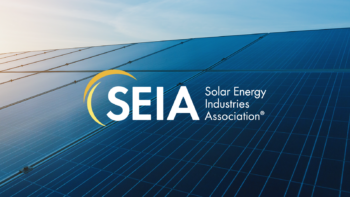SEIA Statement on Chinese Ruling Against US Renewable Energy Programs
Growing trade conflict has potential to severely slow solar’s global growth
WASHINGTON – Rhone Resch, president and CEO of the Solar Energy Industries Association (SEIA), released the following statement today in response to reports that China’s Ministry of Commerce (MOFCOM) has preliminarily determined that six state-level U.S. renewable energy programs violate global trade rules:
“The escalating trade conflict in the global solar industry will ultimately hurt the entire market at a time when solar energy is on the cusp of widespread adoption.
“Today’s ruling is yet another example of the need for dialogue. While trade remedy proceedings, such as those being pursued by both the U.S. and Chinese governments are legitimate, essential principles of a rules-based global trading system, so too are collaboration and negotiation.”
“Now is the time for the U.S. and China to come together in a collaborative dialogue—not through the lens of any one particular trade dispute but in a broader context. As stated previously, disputes within one segment of the industry affect the entire solar supply chain—and these broad implications must be recognized. Today’s decision by the Chinese government underscores this point. We, therefore, repeat our call for the U.S. and Chinese governments to immediately work together towards a mutually-satisfactory resolution of the growing trade conflict within the solar industry.”
As a first step, SEIA and the China Renewable Energy Industries Association have requested that the U.S. and Chinese governments engage the 21 member countries of the Asia-Pacific Economic Cooperation (APEC) in a formal clean energy dialogue on trade. This conversation would provide an excellent framework for a much larger, global agreement on acceptable solar energy policy.
Resch added: “The proverbial saying, “˜you can’t see the forest from the trees,’ rings true in this case. In the long run, continually escalating trade disputes in the solar industry will shut down markets around the world. Companies from all nations will be the ultimate losers. Exporters will find fewer and fewer destinations for their products. Large project developers and local installers will find it more and more difficult to source products. And consumers will see solar energy as a less competitive source of electricity. This is an absolutely unacceptable outcome. A broader dialogue can only complement the legitimate avenues for trade remedies being pursued both here and abroad.”
###
About SEIA:
Established in 1974, the Solar Energy Industries Association is the national trade association of the U.S. solar energy industry. Through advocacy and education, SEIA and its 1,000 member companies are building a strong solar industry to power America. As the voice of the industry, SEIA works to make solar a mainstream and significant energy source by expanding markets, removing market barriers, strengthening the industry and educating the public on the benefits of solar energy. www.seia.org.



